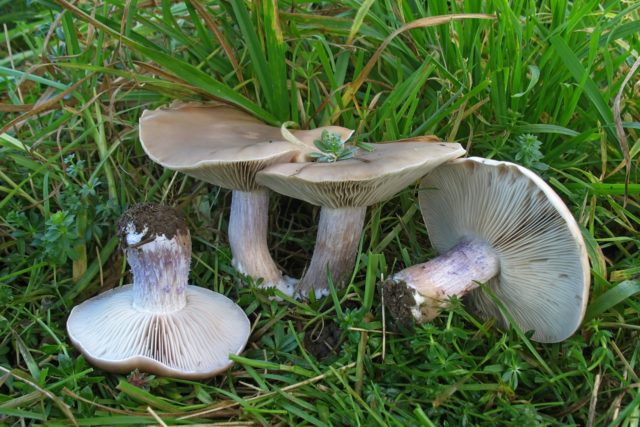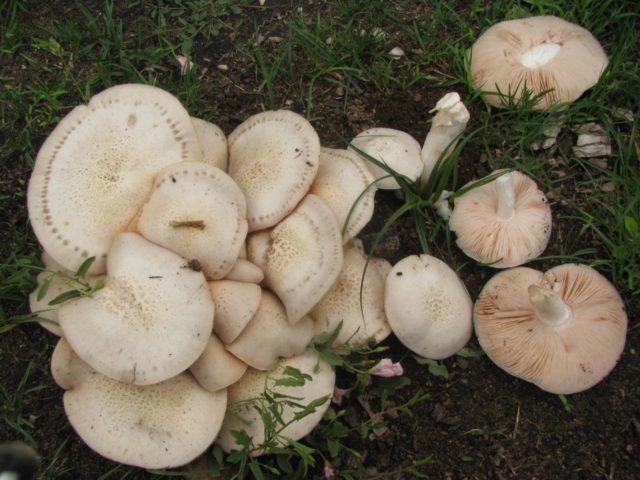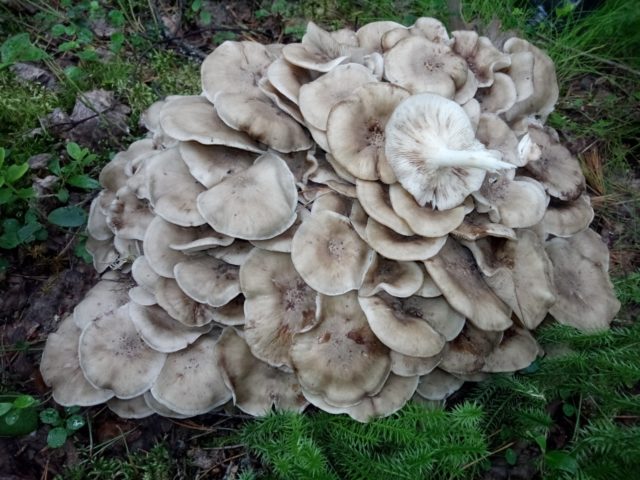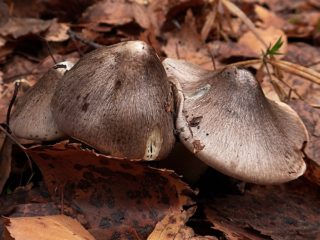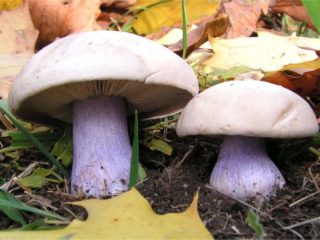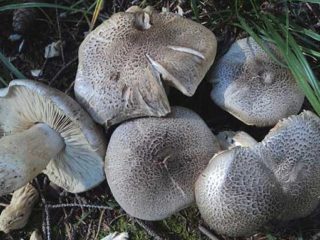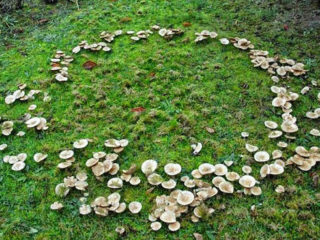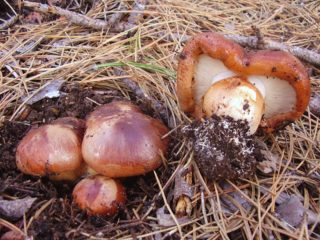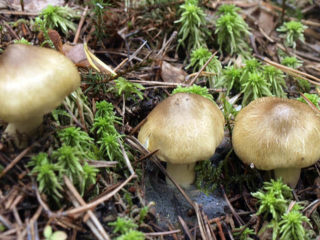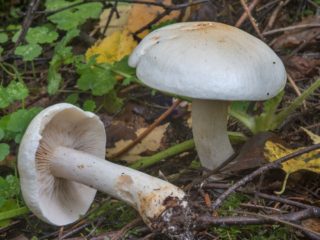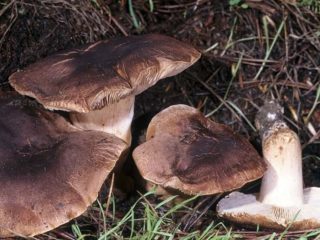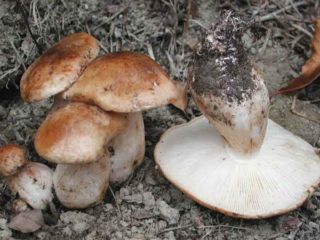Content
One-eyed row (lepista one-eyed) is a conditionally edible species that forms colonies growing in straight rows or in a semicircle. The lamellar mushroom belongs to the family of the genus Lepista. The fruit body has a good taste and a faint aroma.
Where does the one-eyed row grow?
The first rows appear in the spring in the Krasnodar and Stavropol Territories and in the southern regions of the Rostov Region.From late summer to mid-October, one-eyed lepista bears fruit in the central zone. The species is practically not found in the European part. Rowers prefer to settle in open sunny areas among short grass or under low bushes on moist soil. The main accumulation is observed on the edges of mixed forests, near reservoirs, and on roadsides. The row does not grow singly; it forms numerous families located in a semicircle or in a row. There are densely populated areas in which the caps of the fruiting bodies appear fused.
What does one-eyed lepista look like?
The one-eyed row is a medium-sized mushroom, the maximum height of adult specimens is 10 cm, and there are also short representatives (up to 5 cm).
External characteristics of the one-eyed row:
- The cap of the lepista changes shape as it grows: in young specimens it is cone-shaped, then flat with a pronounced convexity in the center, and during the period of biological ripeness it is flat with concave edges. Diameter – 5-20 cm.
- The surface is smooth with a slight gloss, gray in color with a brown tint. There are specimens in which the main color is diluted with a purple tint.
- On the upper part, concentric circles and a rare scattering of watery spots are clearly defined; this feature gave the name to the species. If there is a lack of moisture, spots may be absent, but this is a rare phenomenon.
- The color along the edge of the cap is several tones lighter than the center, it looks as if it is covered with frost.
- The pulp of the fruit body is dense, thick, light gray. Old lepista is loose, and at high air humidity it becomes brittle and watery.
- The smell of the one-eyed row is weak, pleasant, with light floral notes.The taste is subtle, sweetish, mealy.
- The spore-bearing plates are large, sparsely located, tightly fused with the cap, with a smooth transition to the stalk. The edges are uneven, slightly wavy. The color is light gray or brown.
- The spores are elongated, very small, filled with pink or dark beige powder.
- The length of the leg is 3-10 cm, width is up to 2 cm, the shape is cylindrical, tapering at the top, widened near the mycelium. The stem grows upright, with a dense arrangement of fruiting bodies and curved. The structure is solid, fibrous, loose. The leg is the same color as the plates.
Is it possible to eat one-eyed rower?
Lepista is included in the category of conditionally edible species due to its unexpressed taste and faint smell. There are no toxins in the fruiting body. The mushroom does not require pre-boiling. Overripe rows are not used for culinary purposes. Lepista contains a high protein content, which, when decomposed, releases chemical compounds that are poisonous to humans.
Taste qualities of mushroom
The one-eyed row is reminiscent of champignons in taste; mushrooms are characterized by a high gastronomic rating. The taste is pleasant, slightly sweet. The smell is subtle, fruity. When cut, the fruit body does not darken, which simplifies the processing of mushrooms.
Benefits and harm to the body
The chemical composition of the one-eyed row contains a set of vitamins and microelements that are beneficial to the body. The low calorie content of the processed product allows lepista to be included in the menu of overweight people. The high protein content replenishes the necessary supply in the body of vegetarians.
Microelements and vitamins:
- increase immunity;
- improve the functioning of the digestive system;
- lipids in the composition restore liver tissue;
- normalize cholesterol levels;
- improve the condition of the cardiovascular system.
Lepista one-eyed is capable of absorbing and accumulating harmful substances and heavy metals in the fruiting body.
Mushroom consumption is contraindicated:
- if you are allergic to the product;
- if metabolism is disturbed;
- with digestive dysfunction;
- with gastritis in the acute stage.
Not recommended for children under 3 years of age, women during pregnancy and lactation.
False doubles
Externally, twisted lyophyllum resembles the one-eyed row.
The mushroom is classified as a row mushroom, but it grows in dense clumps, which can be located at a considerable distance from each other. The caps of adult specimens are curved and have wavy edges. The legs are short and thick. Color grey-brown. There are no toxic elements in the composition, but the product has no nutritional value. Not recommended for consumption without prior boiling. The remaining representatives of the Lepista genus are similar in appearance and have the same gastronomic characteristics.
Collection rules
One-eyed grass is collected in clearings located far from industrial enterprises and highways. Lepista does not grow in the shade of the forest. Cut off the leg with a knife. Old specimens, as well as spoiled fruiting bodies, are best left unattended. If possible, immediately clean the leg from residual soil and mycelium - this measure will save time on processing the house.
Use
Before cooking, the row is soaked for 10-15 minutes in salted water with the addition of vinegar or citric acid. If there are insects in the fruiting body, they will float to the surface. The remains of dry grass are removed from the cap and stem; the spore-bearing plates are not cut off.After processing, the row is washed and used for cooking. Lepista can be fried, cooked in soup, or stewed with potatoes. Mushrooms are salted, pickled and dried; they are suitable for winter preparations.
Conclusion
One-eyed row (lepista one-eyed) is a conditionally edible species of universal use. Fruit bodies with good taste and faint odor are used for preparing dishes and preparations for the winter. In the southern regions, the row appears in May; in the central zone, the harvest occurs at the end of summer.
